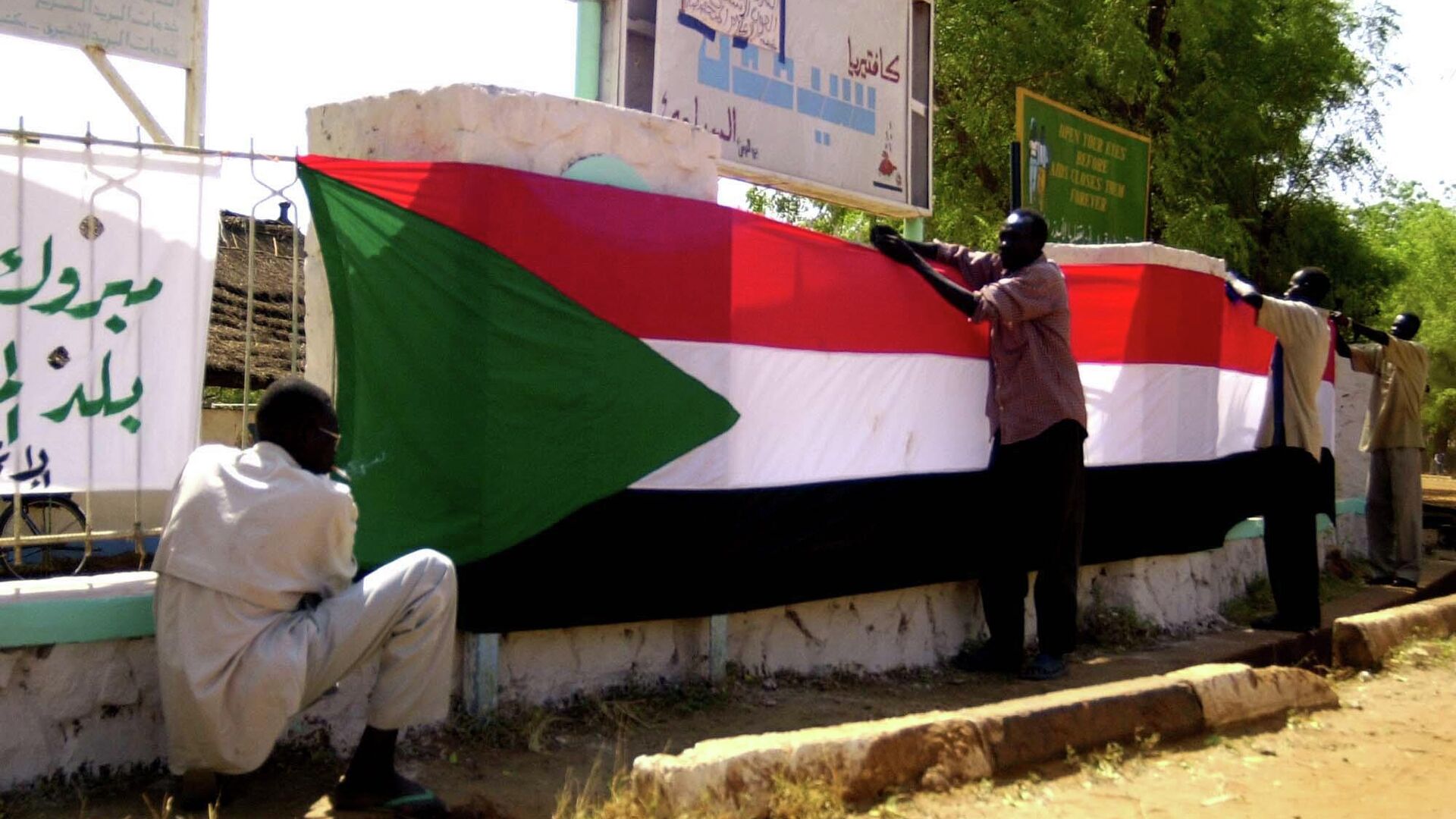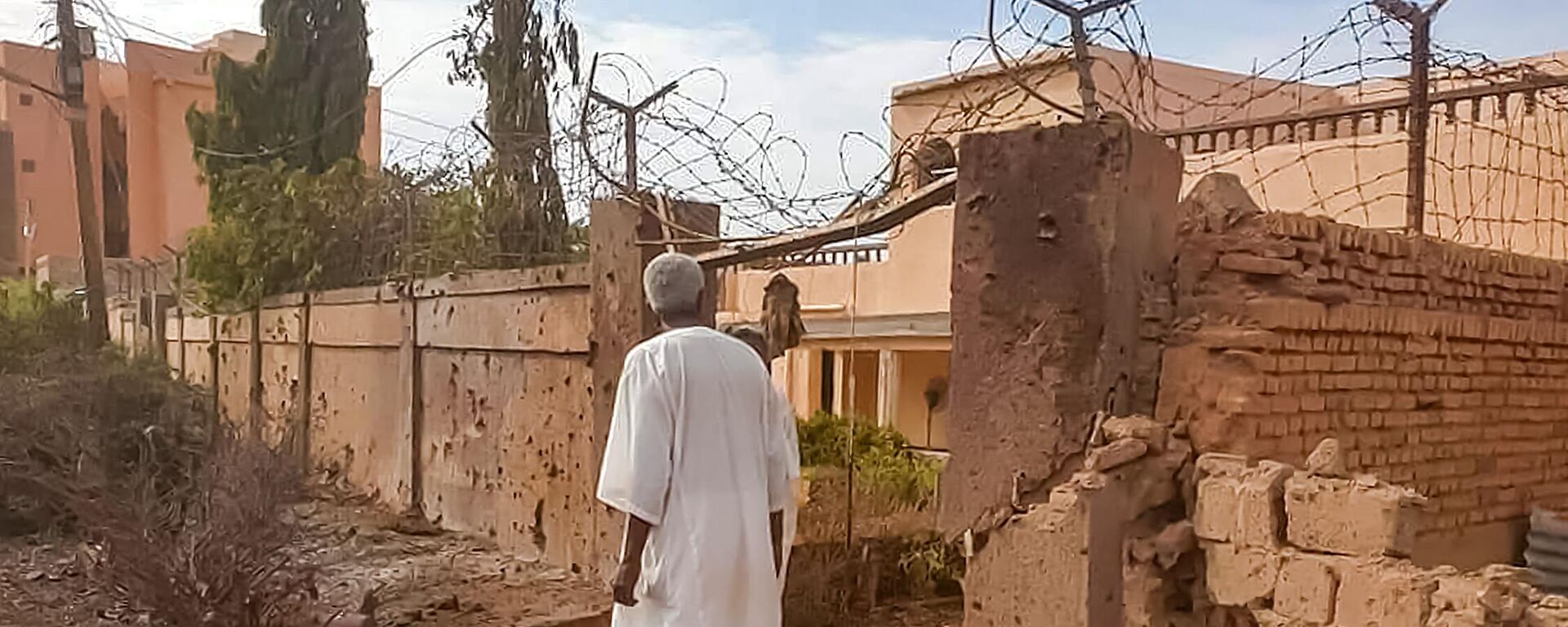https://en.sputniknews.africa/20230806/sides-of-sudan-conflict-not-qualified-to-rule-country-must-submit-to-peoples-will-expert-says-1061114762.html
Sides of Sudan Conflict Not Qualified to Rule Country, Must Submit to People's Will, Expert Says
Sides of Sudan Conflict Not Qualified to Rule Country, Must Submit to People's Will, Expert Says
Sputnik Africa
Violent clashes erupted in Sudan in April between the Sudanese Armed Forces (SAF) and the paramilitary group known as the Rapid Support Forces (RSF), with... 06.08.2023, Sputnik Africa
2023-08-06T17:40+0200
2023-08-06T17:40+0200
2023-08-06T17:40+0200
armed clashes in sudan
north africa
sudan
sudan armed forces
rapid support forces (rsf)
abdel fattah al-burhan
mohamed hamdan dagalo
https://cdn1.img.sputniknews.africa/img/07e7/08/06/1061117338_0:194:2001:1319_1920x0_80_0_0_7a9de2f9a7aca46bf6ecc37a46d77c6c.jpg
The two sides of the ongoing armed conflict in Sudan, the country's army and the Rapid Support Forces, must abide by the political will of the Sudanese people, political researcher and expert on African affairs Abdul Wahid Ibrahim told Sputnik, noting that both warring sides are not qualified to rule the country.Ibrahim added, "The success of the negotiations [sponsored by the United States and Saudi Arabia] is to reach a peace agreement between the two sides, and this does not mean that they are qualified to rule Sudan."The political expert pointed out that "the Sudanese people staged the revolution earlier...and their demands are a full civilian government, the establishment of a full legislative assembly and a full civilian sovereignty council."Ibrahim stressed that there are difficulties in understanding the Sudanese problem by the US and Saudi Arabia with regard to the ongoing negotiations between the warring parties in Jeddah.The Sudanese researcher stressed that the only solution to the conflict "lies in the removal of the two sides [SAF and RSF] from the Sudanese [political] equation."Since April 15, large-scale and violent clashes between the Sudanese army, led by the Chairman of the Sudanese Sovereign Council, General Abdel Fattah al-Burhan, and the Rapid Support Forces, led by Mohammed Hamdan Dagalo, have taken place in various areas throughout Sudan.Both sides have sought to take control of key facilities, including the presidential palace, the SAF general command headquarters, the RSF command, and a number of military and civilian airports in the capital, Khartoum, and other cities.The conflict between al-Burhan and his now former deputy Dagalo, who together staged a coup and overthrew the transitional government of Prime Minister Dr. Abdalla Hamdok on October 25, 2021, became public after the signing of a "Political Framework Agreement" last December.The agreement between the civilian parties and the military component, which includes both the SAF and the RSF, provides for a transitional period and recognizes the withdrawal of the army from politics and the transfer of power to civilians.
https://en.sputniknews.africa/20230805/sudan-may-face-diseases-outbreaks-healthcare-collapse-due-to-ongoing-clashes-says-icrc-1061077022.html
north africa
sudan
Sputnik Africa
feedback@sputniknews.com
+74956456601
MIA „Rossiya Segodnya“
2023
Muhammad Nooh Osman
https://cdn1.img.sputniknews.africa/img/07e7/04/0a/1058467512_0:0:1280:1280_100x100_80_0_0_ec723833bcbfcaed2e21952965ad99e4.jpg
Muhammad Nooh Osman
https://cdn1.img.sputniknews.africa/img/07e7/04/0a/1058467512_0:0:1280:1280_100x100_80_0_0_ec723833bcbfcaed2e21952965ad99e4.jpg
News
en_EN
Sputnik Africa
feedback@sputniknews.com
+74956456601
MIA „Rossiya Segodnya“
Sputnik Africa
feedback@sputniknews.com
+74956456601
MIA „Rossiya Segodnya“
Muhammad Nooh Osman
https://cdn1.img.sputniknews.africa/img/07e7/04/0a/1058467512_0:0:1280:1280_100x100_80_0_0_ec723833bcbfcaed2e21952965ad99e4.jpg
north africa, sudan, sudan armed forces, rapid support forces (rsf), abdel fattah al-burhan, mohamed hamdan dagalo
north africa, sudan, sudan armed forces, rapid support forces (rsf), abdel fattah al-burhan, mohamed hamdan dagalo
Sides of Sudan Conflict Not Qualified to Rule Country, Must Submit to People's Will, Expert Says
Muhammad Nooh Osman
Writer/Editor
Violent clashes erupted in Sudan in April between the Sudanese Armed Forces (SAF) and the paramilitary group known as the Rapid Support Forces (RSF), with Khartoum at the epicenter. Despite several temporary national ceasefires by both parties, the conflict remains unresolved.
The two sides of the ongoing armed
conflict in Sudan, the country's army and the Rapid Support Forces, must abide by the political will of the Sudanese people, political researcher and expert on African affairs Abdul Wahid Ibrahim told Sputnik, noting that both warring sides are not qualified to rule the country.
"The political settlement is only between politicians, but the fighting parties at the moment are military, and they have to comply with the political will," the Sudanese expert said in an interview with Sputnik on Sunday.
Ibrahim added, "The success of the negotiations [
sponsored by the United States and Saudi Arabia] is to reach a peace agreement between the two sides, and this does not mean that they are qualified to rule Sudan."
The political expert pointed out that "the Sudanese people staged the revolution earlier...and their demands are a full civilian government, the establishment of a full legislative assembly and a full civilian sovereignty council."
"The military forces tried to twist the arms of the civilian groups by controlling the economy in Sudan... 83 percent of the state's economy is concentrated in the hands of the military establishment, and its other branch, the RFS," he explained.
Ibrahim stressed that there are difficulties in understanding the Sudanese problem by the US and Saudi Arabia with regard to the ongoing negotiations between the warring parties in Jeddah.
"It is difficult for these two countries to understand the Sudanese problem, especially since their powerful diplomatic arms have not moved to pressure the two sides to engage in serious negotiations to reach a peace agreement," the expert said.
The Sudanese researcher stressed that the only solution to the conflict "lies in the removal of the two sides [SAF and RSF] from the Sudanese [political] equation."
Since April 15, large-scale and violent clashes between the Sudanese army, led by the Chairman of the Sudanese Sovereign Council, General Abdel Fattah al-Burhan, and the
Rapid Support Forces, led by Mohammed Hamdan Dagalo, have taken place in various areas throughout Sudan.
Both sides have sought to take control of key facilities, including the presidential palace, the SAF general command headquarters, the RSF command, and a number of military and civilian airports in the capital, Khartoum, and other cities.
The conflict between al-Burhan and his now former deputy Dagalo, who together staged a coup and overthrew the transitional government of Prime Minister Dr. Abdalla Hamdok on October 25, 2021, became public after the signing of a "Political Framework Agreement" last December.
The agreement between the civilian parties and the military component, which includes both the SAF and the RSF, provides for a transitional period and recognizes the withdrawal of the army from politics and the transfer of power to civilians.



